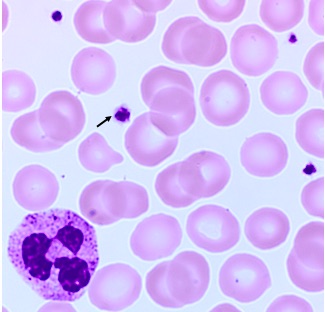Dr Naomi Cornish, Haematology Specialist Trainee at the Bristol Haematology and Oncology Centre, teamed up with Professor Andrew Mumford of Bristol University’s School of Cellular and Molecular Medicine, to identify the genetic changes involved in inherited thrombocytopenia, a condition in which you have a low blood platelet count.
Low platelets
Dr Cornish explains: “Inherited thrombocytopenia is a condition in which individuals have a low platelet count due to an underlying genetic abnormality in any one of a potentially large number of different genes. Patients with this condition can sometimes experience severe bleeding or they may have an increased risk of other health problems, including diseases such as leukaemia. It’s important to try to determine the genetic cause in each case, so we can predict the course of the condition in each patient and monitor for complications.”
Dr Cornish’s project uses the National Institute for Health Research BioResource for rare diseases (NBR-RD) - a national resource of NHS patients with a range of different rare genetic diseases of uncertain basis, including inherited thrombocytopenia. Systematic analysis of the patients’ clinical features and new statistical genetic techniques to evaluate the very large datasets produced by high-throughput DNA sequencing has already uncovered new genes involved in inherited thrombocytopenia and other rare diseases.
Exploring genes
Working with Professor Mumford and his team, Dr Cornish used Elizabeth Blackwell Institute Clinical Primer scheme funding to explore a gene called THPO, which encodes the protein thrombopoietin. This a key regulator of the development and maturation of bone marrow stem cells and megakaryocytes (platelet precursor cells). Very rare patients with faults in both of their copies of the THPO gene are already known to have a life-threatening blood disorder in childhood called aplastic anaemia in which production of all of the three main types of blood cells by the bone marrow is severely reduced.
Single gene
By studying data from more than 8000 people with different rare diseases who joined the NBR-RD and from the associated ThromboGenomics programme, Dr Cornish and the team identified three people in which a single faulty copy of THPO was associated with inherited thrombocytopenia. By performing detailed analysis of blood samples from these patients and their affected family members, she found that the genetic changes in THPO that were present in the families resulted in reduced circulating levels of thrombopoietin and a reduction in circulating platelets but not in any other blood cells from the bone marrow.
The next step was to explore the mechanism of how these genetic changes result in reduced thrombopoietin levels. Dr Cornish did this by introducing the genetic changes into cells grown in the tissue culture laboratory. In each case, Dr Cornish found that the thrombopoietin produced by the faulty gene was made successfully by the cells, but it was not released by the cells in the normal way.
“This research has confirmed that genetic abnormalities in THPO are a cause of inherited thrombocytopenia,” says Dr Cornish. “It also provides evidence for the mechanism of how the changes that we observed in the THPO gene manifest as disease.”
New mode of inheritance
This finding that two different modes of genetic inheritance of changes in the same gene can result in two distinct rare genetic blood disorders, is about to be published in a high impact international haematology journal. Dr Cornish hopes these findings will help to provide enough evidence for the wider genetics community to include THPO in the diagnostic repertoire of genes for investigating patients with inherited thrombocytopenia.

